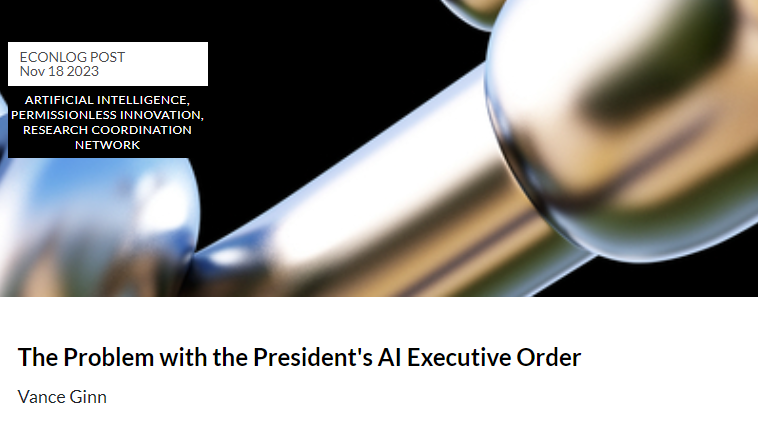|
Originally published at Daily Caller.
A new study from the International Monetary Fund (IMF) has ruffled assumptions, asserting that “40% of global employment is exposed to AI.” The study also predicts that high-skilled jobs will bear the brunt of this transformation, disproportionately influencing roles that traditionally require higher education and professional experience. Among advanced economies, the IMF estimates that the share of jobs affected by AI could be 60 percent. Half of them could benefit from increased productivity, and the other half hurt by replacement. The IMF concludes that the impending shift should compel countries, particularly those well-prepared for AI integration like the U.S., to implement “robust regulatory frameworks.” They argue this would help cultivate a safe and responsible AI environment with safety nets to help those whose jobs are AI “vulnerable.” But we don’t have to look too far back to realize how attempting to harness AI innovation and its results would be disastrous for people and prosperity. The rise of AI presents a unique chance for society to better adapt to challenges and capitalize on new opportunities. Humanity has always adapted to new technological possibilities, turning most disruptions into positive outcomes. For instance, dedicated professionals called “calculators” once performed complex calculations. With the emergence of pocket-sized calculators in 1971, the computing revolution began, showcasing the transformative potential of technological innovation. Those human calculators, who would today be considered high-skilled, highly vulnerable individuals, went behind the machines and created and perfected better computational technologies. Whether or not they felt threatened by the technology, they adapted nevertheless and made their skills indispensable to the technology. As the electronic calculator removed much busy work, their minds were more available to focus on tasks machines couldn’t perform. The emergence of health-related diagnostic tools like X-rays and MRIs did not render doctors less valuable but widened the breadth of their jobs. Tractors did not displace farmers but made aspects of the role significantly more accessible, allowing for higher output. The examples of technology helping humans by making their jobs easier are endless. High-skilled professionals facing AI exposure should view this revolution as an opportunity to learn and grow. Rather than advocating for regulatory barriers, individuals can proactively enhance their skills, pursue further education, earn certificates, or even explore career transitions. The power of spontaneous order in free markets lies in allowing people to innovate when not restricted by government overreach. The IMF study’s conclusion urging countries to hurriedly embrace AI regulation overlooks the resilience and adaptability inherent in free societies. Attempting to pause AI innovation is impractical in the face of rapid advancements by other nations. Our big tech competitors like China and the UAE will not inhibit progress with red tape, so why would we? We’ve already seen demonstrative instances. Recall that in June 2023, Meta launched what was, at the time, the largest open-source language model ever, Llama 2. For almost two months after that, America was the global AI leader due to this technology, only to be eclipsed by the UAE government with their release of Falcon 180b, which has more than double the parameters of Llama 2. In a matter of weeks, America lost its top spot in AI innovation. Imagine what would happen if we introduced more regulatory barriers, as suggested by the IMF, or required a pause in AI advancement, as suggested by Elon Musk and others last year. It’s not just the U.S. reputation as a world leader at stake but our very security, as we could quickly be overtaken by nations who embrace the power of AI in technology, cybersecurity, and beyond. To maintain leadership in the AI landscape, the U.S. must welcome disruptive changes and cultivate an environment encouraging competitiveness. The future belongs to those who can adapt and innovate, and AI, as a tool created by humans, should be embraced rather than feared.
1 Comment
Episode 78 is with Adam Thierer, innovation policy analyst at R Street Institute and author of, “Evasive Entrepreneurs and the Future of Governance: How Innovation Improves Economies and Governments?"
Today, we discuss: 1) What makes nations rich and how America has become the most prosperous nation on earth; 2) The economic importance of failure, freedom, and permissionless innovation; and 3) Why AI and technology must be embraced, and the issues with Biden's AI executive order. Check out Adam's book: https://www.amazon.com/Evasive-Entrepreneurs-Innovation-Economies-Governments/dp/1948647761/ref Please like this video, subscribe to the channel, share it on social media, and provide a rating and review. Also, subscribe and see show notes for this episode on Substack (www.vanceginn.substack.com) and visit my website for economic insights (www.vanceginn.com). Is Being Big Bad? Are Antitrust Accusations of “Big Tech,” “Big Sandwich,” and Others Warranted?12/11/2023 Thank you for tuning into the 74th episode of the Let People Prosper Show podcast.
Today, I’m joined by Jennifer Huddleston, a technology policy research fellow at The Cato Institute. Today, we discuss: 1) What is the proper role of government in regulating or adapting to technological advancements; 2) Pros and cons of restricting AI, and why antitrust accusations are on the rise, specifically targeting “big tech,” and; 3) What you should know about government regulation on social media for minors, and how parents can be empowered to facilitate social media use at home. President Biden signed a sweeping executive order to “harness” and “keep” artificial intelligence, two words you never want to hear from the government. This new regulation will inhibit Americans’ flourishing because restricting free markets never works.
The EO is reported to ensure safety, equity, and responsible development. While these goals may appear laudable, delving deeper reveals that this motion will hinder economic progress and stifle the innovation it aims to promote. That’s why policies must always be judged by their results rather than their intentions. Details of the order’s objectives include safety tests, industry standards, and government oversight to address potential risks associated with AI. Forcing AI companies to conduct safety tests before going public, known as “red teaming,” will significantly slow the development and deployment of AI technologies. It’s well-established that innovation thrives in an environment of minimal regulatory interference called “permissionless innovation.” So introducing these bureaucratic hurdles will hinder fast-growing AI and all the industries that have begun to rely on it. Medicine and biotech, in particular, have realized remarkable potential with AI that has life-saving ramifications. But Biden’s overreaching EO wants to harness that. As is the case with many regulations, the EO comes at not just a cost to the individuals it affects but to the government’s pocketbook as well. As part of its endeavor to “preserve individuals’ privacy,” the administration will fund the Research Coordination Network. At a time when wages aren’t keeping pace with inflation and the average American family is losing real money due to a suffering economy, the government adding an expense like this is an insult to injury. Congress needs to reduce spending, and the Fed needs to slash its bloated balance sheet now more than ever. One of the most troubling aspects of the EO is its emphasis on regulating AI in the workforce out of concern for the technology displacing workers. Although there has been some uproar out of concern over AI destroying jobs, research shows that only 34% of Americans fear job displacement due to AI. And for good reason. Not only now but historically, concerns about new technologies displacing workers have been overblown. A Harvard paper published in 2013 predicted that by 2023, almost half of all American jobs would be replaced by AI. Clearly, the calculation has not come to pass. That’s because technology is a tool, not a threat. Frequently, implementing AI and technology like it allows humans to do more complex or human-facing jobs that AI can’t do or that people don’t want AI to do. AI is a transformative technology that has the potential to revolutionize various industries, from healthcare to finance and beyond. In a free market, competition drives innovation and efficiency, benefiting consumers and businesses. Restricting AI through excessive regulations and government oversight threatens this dynamic. While the intention behind Biden’s EO on AI may be to ensure responsible development and safe use, the economic consequences could be dire. To maintain America’s leadership in AI and foster economic growth, lawmakers and leaders must avoid overregulation and unnecessary restrictions on this transformative technology. Instead, we should encourage innovation, protect intellectual property, and ensure that AI remains a powerful tool for driving economic prosperity and improving the lives of all Americans. In the fast-paced world of technology, the last thing we need is government interference that hampers progress. Originally published at Econlib. Don’t miss episode 70 of the Let People Prosper Show podcast with guest Pete Sepp, president of the National Taxpayers Union.
We discuss the key issues facing AI, technology, and many others. While we recorded this before Biden’s latest executive order regulating AI, we hit on many reasons why we should reject this approach. I am discouraged by President Biden’s new executive order that aims to “harness” artificial intelligence. Pete and I discuss:
Full show notes here. The Biden Administration’s Justice Department took Google to a civil trial on Tuesday, beginning the department’s first major monopoly lawsuit since it took on Microsoft in 1998. What’s the allegation? Google supposedly violated U.S. antitrust laws. But it seems the main “violations” are that Google is good at what they do, consumers love their product and Microsoft is mad.
Jonathan Kantor at the Justice Department (and Lina Khan at the Federal Trade Commission) have pushed an endlessly fruitless crusade against “Big Tech.” Now, it has taken issue with Google’s methods of becoming the default browser on popular devices, which they’ve done through legal means that more savvy people might just call “marketing.” Products like iPhones and MacBooks make it easy for consumers to change their default browser to whatever they prefer. Most of them favor Google because they believe it’s a better search engine. Herein lies the real crux of the lawsuit. Antitrust laws were created to preserve competition. The original laws were rightly deemed too broad and vague, so a new guiding principle of the consumer welfare standard for enforcing these laws was implemented to consider whether consumers are better or worse off from the actions of businesses. In economics, consumer welfare is defined as the “value consumers get from a product less the price they paid.” That value varies from person to person, which is what makes free markets work. Consumers have the ability and the sovereignty to decide which product or service is best for them. To violate the consumer welfare standard would mean moving toward a monopoly. This is when a business has a large market share, or even the market share, such that they can raise prices of their goods or services regardless of quality. The outcome would reduce consumer welfare and, therefore, contribute to potential antitrust law violations. Found guilty, a business could be broken up into smaller parts, forced to sell off part of it or face penalties. In other words, it’s another hindrance to productive activities as targeted employers are forced to beef up on lawyers to deal with federal pushback instead of allocating those resources toward productive means that would help their employees and customers prosper. Despite what the DOJ claims, antitrust laws are rarely enforced to protect consumer welfare, and this case is no exception. Google is not only Americans’ preferred browser, but the company is consistently rated one of the best places to work. So, it seems most of its consumers find value in the product. If they don’t, they can use Bing, Firefox, DuckDuckGo or any other search engine that competes with Google and is readily accessible. So, if this case isn’t centered around consumer welfare or targeting monopolies, what is it really about? If the DOJ wins, which is highly unlikely, American competition and innovation will be stifled. This rent-seeking behavior may win votes with folks on the Left concerned with restricted competition and those on the right concerned about censoring on popular platforms like Google and Meta, but at what cost? Inhibiting free markets with increased regulations is far more likely to drive up prices and decrease consumer welfare than any part of “Big Tech.” This pursuit wastes taxpayers’ dollars that would be better spent elsewhere or, better yet, for the federal government to spend less so people have more money in their pockets to improve their own welfare. At a time when inflation remains too high, the labor market is cooling and Americans are suffering from a bleak economy, this lawsuit is a frustrating misuse of government resources. Moreover, government attempts like this to manipulate markets will always fail due to what economist Friedrich Hayek identified as the knowledge problem. He argued that information (knowledge) is decentralized, dispersed across society and not contained within departments of power. Central planners, in this case the DOJ (and FTC), do not have all the knowledge necessary to designate market competition, and they never will. Free market capitalism cannot be manipulated but must be allowed to work through spontaneous order. This lawsuit attacks free markets and, thereby, free people. Not monopolies or consumer welfare violations, and it’s abundantly clear that neither of those are real problems regarding Google. It’s time for the DOJ to accept defeat and focus on things that actually matter. Ganging up on Google amid all the problems Americans face today, while understanding legitimate concerns with some of Google’s actions, is out-of-touch, to say the least. Originally published at Daily Caller. When was the last time you purchased something online?
If you’re like many people, you’ve probably bought something online this week. And more than likely it was from Amazon though many other companies provide online shopping. In fact, a recent survey found that one out of every four Americans buy items from Amazon at least once per week. If the Biden administration has its way, Amazon could fall victim to trust-busting by the antitrust radicals as the Federal Trade Commission (FTC) gears up to file a lawsuit that could break up the company. This would put a major damper on the satisfaction that so many people have with purchasing from Amazon. But there’s more to this perplexing story. Despite recently trying—yet failing—to stop Microsoft from acquiring Activision, the FTC’s Chair Lina Khan and Assistant Attorney General Jonathan Kanter of the Department of Justice’s antitrust division are doubling down on the administration’s aggressive approach to antitrust enforcement. Americans are rightfully concerned about these radical moves. In my recent co-authored paper, we note how antitrust laws were designed to protect consumers and promote fair competition but rarely achieve these goals due to over-politicization and centralized power. Inevitably, businesses become the antitrust enforcement targets, resulting in less economic growth, innovation, and job creation, leading to higher prices and hindered prosperity. In short, consumers and employers are hurt by antitrust overreach. Bureaucrats too often use antitrust laws to bully businesses in the name of political agendas or vote-seeking initiatives, including empowering labor over management or breaking up successful companies based solely on their large size. This includes recent attempts to discourage “big tech” in the case of the trial against Microsoft. The erratic and changing nature of antitrust laws as power and agendas change leaves employers and innovators uncertain about the future thereby limiting their ability to plan profitable endeavors. For example, determining what constitutes a "restraint of trade" under Section 1 of the Sherman Act, the first-ever antitrust statute, can be challenging. An overly broad interpretation of this phrase can lead to many unintended consequences. Following complications in the Sherman Act, the U.S. Supreme Court recognized the consumer welfare standard that has set the precedent for at least the last 50 years, focusing on a simple question: do economic actions make consumers better or worse off? Protecting consumer welfare, which refers to the value consumers receive above the price they pay for goods and services, should be the driving force behind antitrust enforcement. This concept acknowledges that consumers have the sovereignty to make decisions that support the competitive market process. This has been the standard until recently. A much more activist group of antitrust scholars and practitioners have emerged as advocates for a radical transformation of antitrust enforcement. They largely reject the consumer welfare standard and make sweeping claims that failing to enforce antitrust laws has led to market concentration and wealth disparities, or even the flawed claim of “greed inflation.” But antitrust radicals diverge from the focus on promoting consumer welfare and safeguarding competition. Their main argument is that the consumer welfare standard has allowed concentration and enabled firms to limit output and charge higher prices. Moreover, they advocate that antitrust laws should protect various stakeholder groups, not just consumers, making the consumer welfare standard inadequate. However, evidence suggests the opposite. According to a study conducted by former FTC Commissioner Joshua Wright, there is no empirical basis to conclude that monopoly power is increasing. Other studies indicate that while markups may be rising, output has increased, and quality-adjusted prices have remained stable. The radical approach by Khan and Kanter to antitrust enforcement will not help consumers or the economy, no matter their intentions. We should remember the wise words by Milton Friedman: “One of the great mistakes is to judge policies and programs by their intentions rather than their results.” The key to achieving greater opportunity and prosperity lies in reducing government interference and allowing competition, such as the gains provided by Amazon and Microsoft, to drive better results rather than expanding government. In fact, someone should be addressing the monopolies created by government across the economy, which have questionable at best increases in consumer welfare. If the Biden administration’s proposed new guidelines for mergers go through or other expansions of antitrust enforcement, expect the already strained economy to endure extended suffering as innovation is stifled and consumers bear the brunt. And the satisfaction you get from shopping online may soon not be an option. Originally published at Townall. dEverything old is new again, and that’s turning out to be true in the case of a growing drumbeat to use antitrust tools to rein in big technology companies like Apple, Amazon, Meta, and Google. But as a new policy report from the Pelican Institute points out, expanding the enforcement powers of antitrust agencies will do more harm than good—and an existing approach to protect consumers and producers, while encouraging innovation, is the better path forward. In their report “Antitrust & Enforcement: Letting Markets Work without Empowering Government,” Ted Bolema, Ph.D., J.D., Antitrust and Competition Fellow at the Innovators Network Foundation, and Vance Ginn, Ph.D., Chief Economist at the Pelican Institute, write that while the current frustrations with the size of large tech companies and censorship practices may be warranted, giving government enforcers and bureaucrats more power is not the answer. Instead, existing antitrust laws and the consumer welfare standard are still the best tools for protecting competition and consumers. “For the last 50 years or so, scholars and courts have operated with a consensus about the goal of antitrust enforcement: the consumer welfare standard, which asks, ‘does the conduct in question make consumers better or worse off?’” Bolema and Ginn write. “Antitrust enforcement based on the consumer welfare standard protects one of the most important outcomes of the competitive market process and is worth preserving.” Bolema and Ginn also note that calls to create new antitrust tools in response to conduct by “Big Tech” are misguided and will do far more to empower politicians and government bureaucrats than to prevent abusive conduct by technology companies. “Expanding the enforcement powers of antitrust agencies — as many on the left and some on the right now wish to do — harkens back to an older ‘big is bad’ approach,” they write. “Rather than promoting competition, such a retrograde approach undercuts the competitive market process which provides more innovation, cheaper prices, and better-quality goods and services necessary for continued human flourishing.” Bolema and Ginn say that the consumer welfare standard—and putting power in the hands of consumers and producers— is the tried and true path to ensuring their best interests. “As history has proven, empowering people in the marketplace rather than bureaucrats in government results in more efficient and effective outcomes and better supports liberty and prosperity,” Bolema and Ginn conclude. You can read the full report, “Antitrust & Enforcement: Letting Markets Work without Empowering Government,” here. Originally published by Pelican Institute. Mark Zuckerberg’s new social media platform, Threads, designed by Meta to compete against Twitter, has been the most rapidly downloaded app ever. Receiving more than 30 million downloads in less than 24 hours with more than 150 million downloads to date, Threads is a resounding testament to how innovation and growth are fostered by competition in free markets.
Twitter has seen its ups and downs over the past decade, but things have become more volatile since Elon Musk bought the company last year. By imposing fees for blue check mark verification, a formerly cost-free symbol of authority reserved for authenticated public figures (rightly or wrongly, and I pay for the verification to receive the included benefits), Twitter became more pay-to-play, alienating some of its user base in the process. Then, recently, Musk implemented another paywall limiting tweet visibility, sparking widespread outrage. Combined with the app's roller coaster of breaks and bugs, these changes revealed ample opportunity for more competition. Following a mass exodus of Twitter users, the app’s former users have a new platform to use, and they’re eagerly taking advantage. Recognizing the desire for a less-restricted social media platform, Zuckerburg created Threads. Twitter’s decline parallels regulations that hinder voluntary exchange, frustrate consumers, and stifle economic growth. Sure, this result was self-imposed by Twitter, so it’s not as bad as government-imposed regulations, but similar privately-determined restrictions yield costly results. Entrepreneurs struggle to thrive when the natural flow of the market is restricted by bureaucratic red tape. Just as Twitter’s users were compelled to leave and the app suffered from feature problems, so are consumers and entrepreneurs in the free market discouraged to contribute when there are more hoops to jump through. When markets are allowed freedom to function, competition is encouraged, innovation is rewarded, and economic prosperity is propelled. Striking the balance between necessary oversight and a flourishing free market is essential. But on the whole, regulations give more power to the government and less to the people. This results in less opportunity for innovation and human flourishing. Is Thread’s early success due to Zuckerberg’s reputation and credibility? Possibly. But without the U.S. free market system of capitalism that makes it easier for entrepreneurs to start new ventures compared with anywhere else in the world, Threads’ popularity would not be possible. Capitalism rewards ingenuity, empowers individuals, and enables transformative innovations. As we witness the unfolding journey of Threads, it is an opportune moment to show gratitude for our free market system and recognize the importance of preserving that liberty. When we champion these values and discourage their inhibitors, including regulations and barriers to innovation, we’re keeping America’s entrepreneurial spirit alive. Threads is the current hot topic among inventions, but in the free market system of the U.S., who knows what could be next? Competition should be encouraged to improve customer satisfaction and provide more job opportunities. Originally published by Real Clear Policy. Re: “Protecting kids on social media — Texas House’s proposed age limit is a step forward,” Thursday editorial.
While some connect social media use with teen depression and suicides, evidence is unclear. The Economist noted, “If social media were the sole or main cause of rising levels of suicide or self-harm — rather than just one part of a complex problem — country-level data would probably show signs of their effect.” They don’t. Underlying causes of depression and suicide are often much deeper for teens, best addressed by parents, yet some want to give it to government bureaucrats. The latest attempt is Texas House Bill 18, supported by your editorial board. The bill would essentially ban teens from social media and force all to register online. It excludes YouTube by picking it as a winner with an educational provision. Though well-intended, the bill would have many costly unintended consequences. Teens could lose benefits from connecting with family and friends and learning new things, have less information in a growing digital world and possibly choose less-desired activities. Everyone registering for digital services reduces privacy and security. Texas should empower parents to decide for their kids — many of us may choose to keep our kids offline — not government bureaucrats. Vance Ginn, Round Rock Originally published at the Dallas Morning News. The mental health of preteens and teenagers across America has been a growing concern as suicide remains the third highest cause of their deaths. The causes of suicide are largely unknown and complex.
Some point to the decline of the family structure, with fewer two-parent households, more parents working full-time, and subsequently more kids spending less time with family. Others tie the cause to fewer Americans actively practicing religion and raising their children to lean on their faith in times of stress and uncertainty. And then there are those who blame social media and other interactive digital services, where minors are increasingly spending their time. Whichever cause is contributing to the problem of suicides by teens is a serious one, worthy of research and solutions. A growing number of state lawmakers have introduced legislation aimed at curbing the use of social media and other interactive digital services by minors. Those bills often require age verification, nullify online contracts entered into between minors and companies offering those services, establish curfews when minors are prohibited from using them, and authorize private rights of action where individuals can sue companies and be awarded damages. But it has not been established that social media – this thing that youth have quickly embraced and mastered, but many older adults don’t like or are still trying to figure out – is indeed the biggest problem. If it is, then which specific aspects or activities are most problematic and how can they be isolated to address them? Instead of getting to the root causes, those who suspect it’s bad or believe that it’s at least a contributor to mental health challenges are throwing the kitchen sink at it, seemingly overlooking the practical implications of increased regulation and the dangers of inviting government to co-parent. Take, for example, age verification requirements. Proponents say these requirements exist only for minors, but in order to prove that one isn’t a minor, all users must provide their personal information to the social media company or its third-party provider, which matches the information against official government records. It’s not like a person attempting to buy beer or cigarettes at the grocery store, where a cashier must “card” those who appear to be underage. When accessing the Internet on a computer, cell phone, or other electronic device, the only way for a person to prove that he or she isn’t a minor is to go through the entire age verification process…for every single program or service he or she uses. And this would apply to every user in the state. Some argue that the risks to minors justify these burdensome new requirements, but when adults suddenly begin having to provide their personal information to access multiple online programs they’ve used for years (and not knowing where that personal information will be stored, how will it be used, whether it will be shared, and more) and then find out why, expect lots of angry phone calls to lawmakers’ offices. This brings up a number of other questions that should be answered. Whose job is it to monitor and, if necessary, restrict minors’ access to technology in the first place? Is it the role of government to set curfews or establish limitations for the activities of minors in the home and/or while under the supervision of a parent or legal guardian? Should parents, schools, or others bear the responsibility of educating minors about the appropriate uses of technology, the Internet, and social media? Is enough being done to establish healthy behavior patterns and warn against the dangers of overuse, bullying, inappropriate contact, and engaging with strangers? If not, shouldn’t we start there before introducing government restrictions? Also, could overregulation by the government lead to unintended consequences such as kids losing access to educational and other positive materials? Could it lead to them being denied the opportunity to connect and socialize with peers, family members, and others around the world who their parents know and trust, all because the government makes giving them access so burdensome? Is government really prepared to restrict citizens’ access to one of the greatest innovations, sources of knowledge, and enablers of human interaction made available in our lifetime? And for social media programs and interactive digital services offered across the globe, how will companies comply with potentially dozens of rules and regulations that differ from state to state? Is that even possible, and should the rules differ for Louisianans than for people living in Texas, Arkansas, and Mississippi? Rather than throwing the kitchen sink at it with bigger government, let’s be thoughtful about the best ways to address the needs of young people and their families while ensuring that solutions will actually work, are workable, and don’t trade individual liberties for more government. We’ve tried that too many times before, and the results aren’t good. Originally published with Erin Bendily, Ph.D., at Pelican Institute for Public Policy. This Week's Economy Ep. 6: NEW GDP Report, Debt Ceiling Bill, School Choice & State Budgets4/28/2023 In today's episode of "This Week's Economy," I discuss the latest GDP report, the House Republicans passing a new debt ceiling bill, School Choice, state budgets, social media bans, and more. Thank you for listening to the 6th episode of "This Week's Economy,” where I briefly share my insights every Friday morning on key economic and policy news at the U.S. and state levels.
Today, I cover: 1) National: Findings from the latest GDP report released yesterday (April 27th) and the debt ceiling bill passed by House Republicans; 2) States: Updates on Universal School Choice and budgets across states, especially Texas and Louisiana; and 3) Other: Bills circulating on restricting social media, and more. You can watch this episode on YouTube or listen to it on Apple Podcast, Spotify, Google Podcast, or Anchor (please share, subscribe, like, and leave a 5-star rating). For show notes, thoughtful economic insights, media interviews, speeches, blog posts, research, and more at my Substack directly in your inbox. There's a lot of talk about the harms of social media on teens. Notable experts on both sides of the issue struggle to reach consensus. But state lawmakers are moving ahead with legislation to ban teens from social media.
The issue is, even if we assume the worst, a ban is a short-term fix to a potentially longer-term problem. Worse, it will likely do more to avoid dealing with teens’ underlying problems by taking control away from parents. And it could shortchange teens of many benefits online for education, networking, and more. If these issues are truly due to social media, when teens turn 18 and become “legal adults,” the issues will continue. The only difference a ban will make is that when teens become adults, and move away to start their lives, they won't have their parents to guide them online. They’ll have missed out on the opportunity to have productive discussions about safe practices with their parents. Despite what legislators are claiming, bans aren’t a pro-parent approach. Legislation to ban minors from social media gives the government (politicians and bureaucrats) the power to decide what’s best for children. And as usual, it's set to do a poor job of it. Earlier this year, Utah became the first state to ban teens from social media. The pair of bills ban teens under 16 completely and impose heavy-handed restrictions for sites allowing teens 16 to 18. Those restrictions include state-mandated curfews, intrusive age verification, punitive fines on companies with sites subjectively considered to be too appealing, and a presumption that any harm a child experiences is the result of social media. Parental consent is required for teens 16 to 18 to create an account, but that’s the end of a parent’s input into what they want for their teen. Now Texas, Arkansas, and other states are following suit. While legislators praise these bills as a solution to the mental health crisis facing teens, these provisions don’t address the underlying problems from many factors. Adding to the debate about whether social media is a significant cause of depression, experts are also grappling with how to reduce cyberbullying, curb exploitation, and protect teens from predators online. State efforts have done more to gloss over the problems teens are facing in the name of parental choice, missing opportunities to address specific issues and avoiding the unintended consequences of such actions. What’s more, the specifics in these bills, like state-imposed curfews and civil penalties, constitute a draconian approach that removes parents from choosing what’s best for their kids. Rather than banning teens from engaging in our connected world, we should separate the concerns into actionable items. Experts, stakeholders and parents alike should be given time to propose solutions with meaningful input that prepare teens to safely and responsibly enter the technology-integrated world. The hard part, of course, is reaching a consensus. To some, that’s why an all-out ban on allowing teens on the Internet would do the trick. But that would ignore the reality that teens will one day become adults and find themselves unequipped to contend with an online world, less productive, and more at risk of the concerns given for bans. It also takes the power out of the hands of parents, who are the ones best positioned to find what’s best for their kids, and puts it in the hands of bureaucrats. Government meddling in the parent-child relationship rarely works well, and there’s little reason to believe this time will be different. That goes for Utah, Texas, Arkansas, and any other state that tries to help kids by disempowering parents. If the warning signs are true, and social media is creating all the harm talked about in the news, we can’t simply ban the problems away. We’ll need to address them head-on with solutions that balance liberty, free speech, privacy, and parenting. Without these, we will fail to set up the next generation for offline and online success. Originally published at The Center Square. In Let People Prosper episode #40, I talk with Max Gulker, Ph.D., about whether Big Tech is a monopoly, FTC's overreach with regulations, & benefits of network effects to let people prosper. On today's episode of the "Let People Prosper" show, which was recorded on March 21, 2023, I'm thankful to be joined by Dr. Max Gulker, Senior Policy Analyst at Reason Foundation.
We discuss:
Dr. Gulker’s bio and other info (here):
|
Vance Ginn, Ph.D.
|








 RSS Feed
RSS Feed